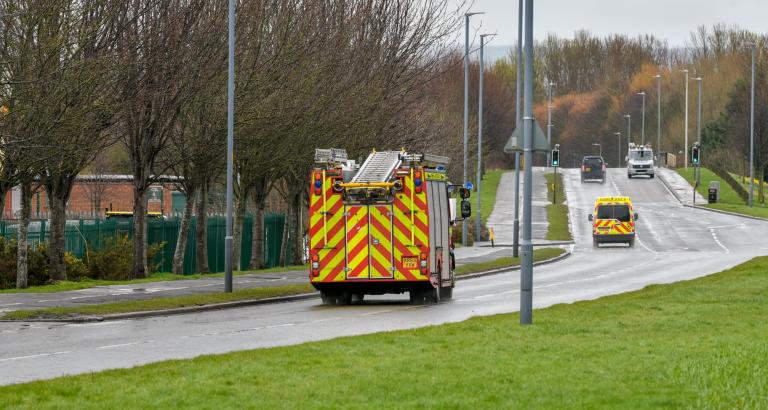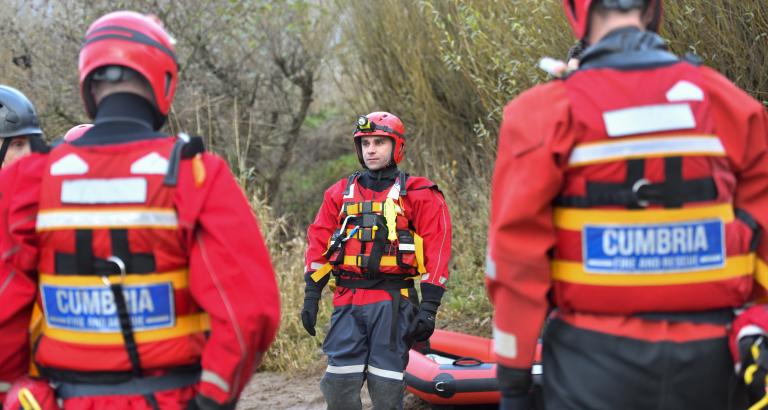Safety outdoors
Fire safety does not stop at your front door, there are significant risks to be aware of outdoors too.
Here in Cumbria, we have some of the most stunning scenery in the UK - we'd really appreciate your help to keep it that way. Warmer weather and the increased numbers of people visiting the countryside creates a greater risk of fire. When you're out and about, please follow our safety information to stay safe.
Barbecue safety
- Enjoy yourself, but don't drink too much alcohol if you are in charge of the barbecue or any cooking!
- Make sure your barbecue is well away from sheds, fences, trees, shrubs or garden waste.
- Never leave a barbecue or any cooking unattended.
- Never use a barbecue indoors.
- Keep a bucket of water, sand or a garden hose nearby for emergencies.
- Follow the safety instructions provided with disposable barbecues.
- Never use petrol or paraffin to start or revive your barbecue; use only recognised lighters or starter fuels on coal.
- Empty ashes onto bare garden soil, not into dustbins or wheelie bins. If they're hot, they can melt the plastic and start a fire.
Camping
When you are going camping, follow these basic precautions to reduce the risk of fire starting and spreading:
- Never use candles in or near a tent - torches are safer.
- Don't smoke inside a tent.
- Place your cooking area well away from the tent.
- Before you set off, get the contact details of the local fire and rescue service.
- Set up tents at least six metres apart and away from parked cars.
- Make sure you know what the fire arrangements on the camp site are and where the nearest telephone is.
- Keep your cooking area clear of items that catch fire easily ('flammable' items), including long, dry grass.
- Put cooking appliances in a place where they can't easily be knocked over.
- Keep matches, lighters, flammable liquids and gas cylinders out of the reach of children.
- Have an escape plan and be prepared to cut your way out of your tent if there is a fire.
Caravans
Having a working smoke alarm when you're staying in a caravan is just as important as having one in your home. Additional messages for those living in caravans include:
- Ensure caravans and tents are at least 6 metres apart and away from parked cars.
- Make sure you know what the fire arrangements on the camp site are and where the nearest telephone is.
Inside the caravan:
- If you smoke, use metal ashtrays - and never smoke in bed.
- Don't leave children alone inside.
- Don't block air vents - if any leaking gas builds up you may fall unconscious and be unable to escape.
- Turn off all appliances before you leave the caravan or go to bed.
- Never use a cooker or heater whilst your caravan is moving.
- Install a Carbon Monoxide (CO) alarm within the caravan for extra safety.
If there's a fire in your caravan:
Get everyone out straight away.
Call the fire and rescue service and give your location with a map reference, if possible, or provide a nearby landmark, like a farm.
Carbon monoxide dangers if camping or caravanning
Faulty gas cookers, appliances or petrol-powered generators can lead to carbon monoxide poisoning. When camping or caravanning, despite being out in the fresh air, carbon monoxide can build up to levels that can kill very quickly in enclosed spaces, such as tents and awnings. It is essential that people take care when using barbecues and make sure that they are safe and used in properly-ventilated spaces.
Follow this advice when using a barbecue, whether it's a disposable one, gas or charcoal:
- read the manufacturer's instructions
- never take a smouldering or lit barbecue into a tent, caravan or cabin - even if you have finished cooking
- never use a barbecue inside to keep you warm
- never leave a lit barbecue unattended or while sleeping
- dispose of it safely, ensuring all fire and ashes are completely extinguished
If you're using gas camping equipment, follow these extra tips to help you stay safe:
- read the manufacturer's instructions
- never take a gas stove, light or heater into a tent, caravan or cabin unless it's a permanent fixture, installed and maintained correctly
- check that the appliance is in good order, undamaged and that hoses are properly attached and undamaged - if in doubt, get the hoses replaced or don't use it
Dry ground in the summer means there's an added risk of a fire starting, but you should take care at all times of the year. Follow these tips to reduce the chance of a wildfire in the countryside:
- Extinguish cigarettes properly and don't throw cigarette ends on the ground - take your litter home.
- Never throw cigarette ends out of car windows.
- Avoid using open fires in the countryside.
- Don't leave bottles or glass in woodland - sunlight shining through glass can start fires (take them home and recycle them).
- Only use barbecues in a suitable and safe area and never leave them unattended.
- If you see a fire in the countryside, report it to the fire and rescue service immediately.
- Don't attempt to tackle fires that can't be put out with a bucket of water - leave the area as quickly as possible.
In the countryside
Every year, fire destroys thousands of acres of countryside and wildlife habitats. Some fires are started deliberately, but most are due to carelessness.
- Put out cigarettes and other smoking materials properly before you leave your vehicle.
- If you see a fire in the countryside, report it immediately.
- Avoid open fires in the countryside. Always have them in safe designated areas.
- If you can, prepare for the arrival of the fire and rescue service at the pre-arranged meeting point, by unlocking gates, etc.
The Countryside Code applies to all parts of the countryside. Most of it is just good common sense, designed to help us all to respect, protect and enjoy our countryside.
The Code makes it clear what the responsibilities are for both the public and the people who manage the land. It has information about rights, responsibilities and liabilities and how we all have a duty to protect the countryside. Together with common sense, it helps to make it easy for visitors to act responsibly and identify possible dangers.


